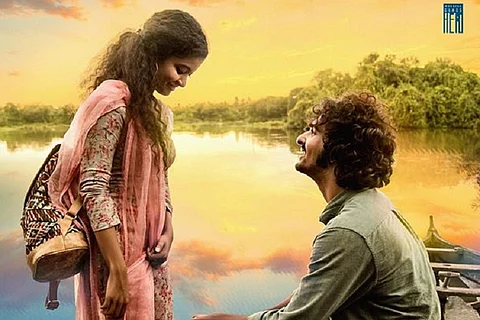

The poster is of three men rowing a boat on a moonlit night, towards somewhere. The image I bring back home from Kumbalangi Nights is of that ‘somewhere’ they row towards. A house on the shore that one of the men describes as a place in which those, whom no one wants, end up. A house and a neighbourhood in Kochi that at the end of the movie you feel so close to, for that’s how easily Syam Pushkaran’s story snatches your heart away, helped by some really powerful performances by the likes of Soubin Shahir, Fahadh Faasil and Shane Nigam.
One of the later occupants of the house calls this house beautiful. And the youngest of the four men of that house – Franky by name – asks in surprise, “Really?”. He had once told his eldest brother – Saji played by Soubin Shahir – that it is the worst house in the panchayat, made so bad by his two brothers who are always at each other’s throats. Saji and Bobby (Shane Nigam) can’t even make peace on their late father’s remembrance day. Bonny (Sreenath Bhasi), the brother who comes to visit, sees the fighting and rows the boat away.
There, without a voiceover that appears to have become customary in movies these days, without any grand entries, new director Madhu C Narayanan, coming from Aashiq Abu’s school of filmmaking, introduces you to the house that will become the centre of Kumbalangi Nights. Shyju Khalid’s camera makes sure you know every corner of the house and the water towards which it looks out. It is a house that had once seen happy days and nights, you know from the disappointment in the youngest’s face, missing a mother who’s gone away and a brother who rows away. Something snapped as things do in broken families, and new ways of life set in. The aimlessness of men who wake up to just pass days by, sponging on another, sitting by when the sun is up and drinking in the evening. Aims sometimes crop up as new people coming to your life, or else incidents that scar you for life.
Curly haired Anna Ben looks every bit a schoolgirl and that’s how she is introduced. “Baby mol used to drink from a milk bottle till three years ago,” her sister Simi (Grace Antony) says. Simi has just got married when the movie begins – and the new man isn’t too friendly, the boys tell Franky who has come home from school for vacation. You see what they mean in the scene when Fahadh Faasil comes on screen - as the endlessly smiling Shammi. You cannot begin to describe how, just by smiling and speaking overly politely, he creeps the hell out of you. Fahadh doesn’t show up much on the screen, what with the script dealing so beautifully with the stories of four brothers in the neighbourhood. But when he does, with no background music – with which Sushin Syam otherwise attaches you to the stories of these men – and not even a word wrongly said, Fahadh brings in tension.
So you can imagine what it would be like when a lad like Bobby falls in love with a girl like Baby, coming from a house like that. Bobby of course doesn’t easily mend his ways. He is irritable as the man who tells his friend, “Who buys a tea shop to get tea?” when he hears about the friend’s marriage plans. But from his behaviour, you know he is not a man you need to be wary of. It’s just words. Not like the smiling Shammi. Baby mol does not even try to change anything about Bobby. But what’s pretty here is that she doesn’t try to change anything about herself either. They adapt to each other without long lines spoken, with lines as simple as "Is true love really out of fashion? Am just asking cause I don’t know." It sounds beautiful in the moment, in Malayalam. Syam Pushkaran does it again.
He ticks off quite a few social realities with moments like these that make them appear so insignificant. There’s a scene where Simi asks Baby, isn’t he a Christian and Baby says, “Jesus is not someone we don’t know.” Again, it has to be in Malayalam. Religion taken care of, Syam and Madhu, the director, then address patriarchy. And you realise it only later, for that’s how easily they do it. Simi, who seems so much like the stereotypical nodding-along-with-the-husband type of a woman, and whose voice is the kind you ignore when there is an argument in the house, suddenly breaks a mosquito bat and silence falls, making you and the others in the house listen to her. As a viewer used to scripts that depend on another male figure having to step into the house to stop abuse, you are taken pleasantly by surprise at this little interference. Why do you always need to look outside for help, really?
In fact, these traditional roles appear changed when the house that really needs help is that of the four men - played by all four actors in ways that could put a knot in your heart. And help comes in the form of women – a widow, a foreigner and a really young girl in love. Sushin Syam paints the screen with his music when you try to swallow this beautiful little thought, and think helplessly of love and what it can do to people.
Disclaimer: This review was not paid for or commissioned by anyone associated with the film. Neither TNM nor any of its reviewers have any sort of business relationship with the film's producers or any other members of its cast and crew.